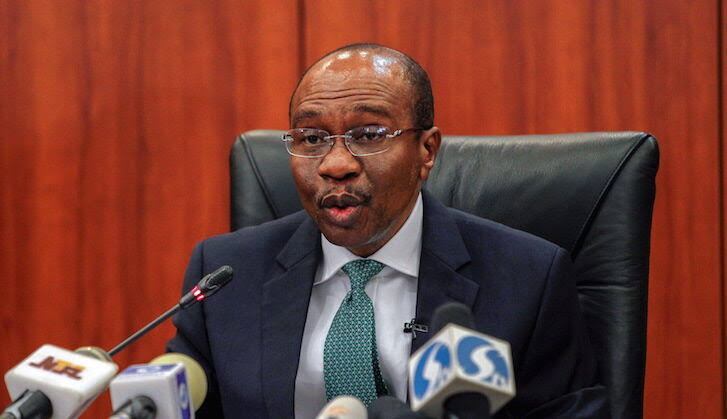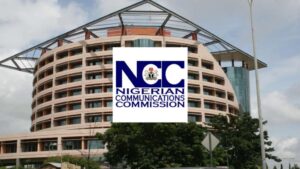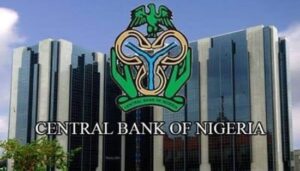
The Central Bank of Nigeria (CBN) will leave interest rate unchanged for a long while, its Governor, Mr. Godwin Emefiele, said yesterday.
He told journalists at the end of a two-day meeting of the Monetary Policy Committee (MPC) in Abuja that the apex bank was not in a hurry to bring down the Monetary Policy Rate (MPR) otherwise known as interest rate.
But the CBN would rather take other measures, including the prescription of minimum loan advance by banks to the private sector, to boost growth.
Emefiele said: “Like we said, we will like to see inflation trend into single digit territory. That the CBN itself has set an inflation target of between six to nine per cent and because we are still above that threshold, we will only do so cautiously either through signaling; we are not going to be in a hurry to moderate or to bring down the MPR.
“However, without necessarily altering or adjusting the MPR, we can take other measures like the measure that we adopted by prescribing minimum loan deposit ratio to the banks.
“That will help in a drive to increase the loans deposit and indeed, because banks themselves know that if they do not do what we want, as raised in the guidelines, we would take the money that they have and put them in CRR and because they know that it is a big challenge for them, that is why the rates are beginning to trend. There is a price war going on now.”
The CBN governor also reiterated the determination of the apex bank to restrict milk importation, which gulps between $1.2 billion and $1.5 billion annually, describing it as unacceptable.
However, the apex bank, at the end of MPC meeting, resolved to leave the MPR unchanged at 13.5 per cent and held other parameters constant.
It also retained the asymmetric corridor at +200/-500 basis points around the MPR. The Cash Reserve Requirements (CRR) and Liquidity Ratio remained at 22.5 per cent and 30 per cent respectively.
Emefiele, who read the committee’s communiqué, said tightening monetary policy stance was not an option, adding that restriction of the capacity of the deposit money banks to create money could curtail their credit creation capabilities.
According to him, the key macroeconomic indicators are trending in the right direction.
The MPR is the rate at which the CBN lends to the real sector and often determines the cost of borrowing.
Emefiele said the MPC, in arriving at its decision to hold rates at their current values, considered the need to boost output growth through sustained increase in consumer credit and mortgage loans and granting loans to our small and medium enterprises companies.
The committee further observed that the management of the bank had started the prescription of using benchmark loan-to-deposit ratios to redirect the banks focus to lending, adding that to mitigate credit risk, the committee enjoined the CBN to de-risk the financial markets, via the development of a reliable credit scoring system, similar to what applies in the advanced countries as this will encourage Deposit Money Banks (DMBs) to safely grow their credit portfolios.
He said the MPC called on the fiscal authorities to expedite action on expanding the tax base of the economy to improve government revenue and stem the growth in public borrowing and urged the fiscal authorities to build fiscal buffers to avert macroeconomic downturn in the event of a decline in oil prices.
According to the CBN governor, the committee also called on the CBN to intensify efforts to encourage Nigerians in the diaspora to use official sources for home remittances, noting that the effort will complement other measures geared towards improving Nigeria’s current account balance.
The committee asked the CBN to consider introducing incentives such as the reduction of charges on diaspora home remittances into the country.
He said: “On the African Continental Free Trade Agreement (AfCFTA), the committee urged the federal government to put in place measures to aid the economy in realising the benefits and full potential of that agreement. In particular, it noted the need to resuscitate moribund industries in Nigeria and improve key infrastructure in order to strengthen the productive base of the economy, create job opportunities as well as boost exports.
“The committee noted the positive developments towards the creation of a common currency in the West African Zone by January 2020 and commended government and the Central Bank for pushing forward the initiative. The committee, however, enjoined the bank to ensure that Nigeria is properly positioned to maximise the benefits of monetary integration.”
In consideration of the specific policy options to adopt, especially whether to hold, loosen or tighten, the MPC observed that while the focus on growth was imperative, the mandate of price stability remains sacrosanct.
It said given the happenings in the external sector and the fact that inflation is moderating, tightening of monetary policy should not be an option at this time, as restriction of the capacity of the DMBs to create money could curtail their credit creation capabilities.
Emefiele said: “On the contrary, the Monetary Policy Committee (MPC) was of the view that whilst loosening could increase money supply, stimulate aggregate demand and strengthen domestic production, the economy could be awash with liquidity, especially if loosening drives growth in consumer credit without commensurate adjustment in aggregate output.
“On holding the current monetary policy position, the Monetary Policy Committee (MPC) observed that given the recent actions of the bank’s management involving the prescription of minimum lending thresholds by the deposit money banks to our Deposit Money Banks (DMBs), it is safe to assume that this action, targeted at stimulating credit growth to the real sector would increase credit delivery to the real sector and accelerate investment and economic growth.
“It also observed that since interest rates were currently trending downwards, it is safer to await the full impact of these policy actions on the economy before a review of the position of monetary policy.”
He also clarified that contrary to speculation, there were no plans by the CBN to bar deposit money banks from investing in treasury bills and Open Market Operation (OMO) instruments.
“You will recall that at the last MPC meeting in May 2019, MPC committee mandated management that given what we observed at the meeting, that there was a flat position in lending from DMBs to the industry; that there was need for management to look into how the banks can be refocused to do more of the lending to the private sector in order to grow the economy.
“Like you all know, the only set of institutions or persons by law that can conduct financial intermediation from a surplus sector to a deficit sector are banks.
“If they cannot provide that responsibility, then we are having problems. We will love to see the banks as financial mediators to play this role because that is one way they can be seen from the monetary policy side to catalyse growth in the Nigerian economy.
“And in an attempt to do that two weeks ago, we released a guideline that prescribes the minimum lending ratio for banks because we said we will no longer allow a situation where banks collect deposits from customers, all they do is bring the money to the CBN or to government to invest in instruments and after 90 days, 180 days, one year, they come to CBN and we cut them a cheque and they put it as income in their balance sheets and then they declare billions of naira-I am a banker myself.
“It is part of their roles but the core role that is required and desired from the banks today is that they should act as financial inter-mediators to provide credit to the private sector of the economy.
“And in that guideline, we said we would give them certain carrots or incentives that when they lend to the consumer credit, mortgage credit, to SMEs, that we will grant them certain dispensations that they will be happy about but that if they do not do it, then that we would apply certain sanctions that would lead to taking at least 50 per cent of the unlend portion of their loans into the CRR.”
According to him, the CBN is going to begin a month-by-month monitoring and prescription of loan deposit ratio to the banks after the September 30 deadline.
“It is because we all must work together as Nigerians to do everything that is possible to grow this economy and the CBN in conjunction with the DMBs who are at the monetary side of policy of this country must be seen to play this role and if we don’t play this role, then we have failed in our responsibility,” Emefiele added.
On the ban on the importation of milk, he said domestic production of milk had the potential to reduce recurrent farmer-herder clashes, which have stifled the growth of the agricultural sector.
He stated that despite the CBN’s initial engagement with major players in the milk industry, there were attempts by some big players to frustrate the policy on local production of milk.
You may be interested

PSG To Reignite Interest In Osimhen
Webby - December 21, 2024Paris Saint-Germain have contacted Napoli to discuss signing Victor Osimhen in January, according to reports in France.It is reported that…

Arteta Provides Injury Updates On Five Arsenal Players Ahead Palace Clash
Webby - December 20, 2024Arsenal manager Mikel Arteta has revealed that Declan Rice and Riccardo Calafiori are both available to be in the Gunners…

Carabao Cup: Spurs Edge Man United In Seven-Goal Thriller To Reach Semi-finals
Webby - December 19, 2024Tottenham Hotspur edged Manchester United 4-3 in the quarter-finals of the Carabao Cup on Thursday.Spurs raced to a 3-0 lead…




















![American Pastor, David Wilson Seen Eating The Box Of Woman Who Isn’t His Wife [Video]](https://onlinenigeria.com/wp-content/uploads/2019/10/american-pastor-david-wilson-seen-eating-the-box-of-woman-who-isnt-his-wife-video-150x150.jpg)









